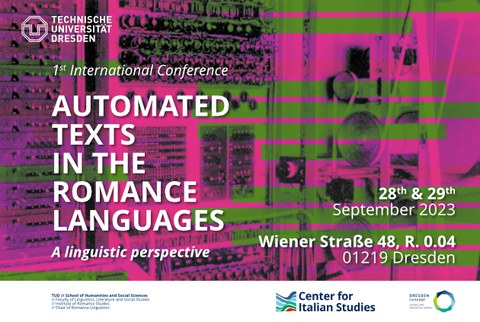Ai-ROM-I Conference 2023
Inhaltsverzeichnis
1st International Conference on “Automated texts In the ROMance languages” (Ai-ROM)
Automated texts belong to a rapidly evolving field and have a high degree of disruptive power. From a technical standpoint, they are generated with new and increasingly sophisticated techniques, involving the use of algorithms and (soft) artificial intelligence. From a communicative perspective, they are in the process of revolutionizing the way texts are conceived, produced, distributed, and consumed. As they grow in number, improve in quality, and expand in variety, automated texts are set to become an important part of our lives over the next decade.
The 1st Ai-ROM Conference aims at bringing together researchers from all areas of Romance Linguistics and neighboring fields (Communication Science, Media and Journalism Studies, Computational Linguistics) to reflect on automated texts from a variety of perspectives: theoretical, descriptive, and practical. We understand ‘automated texts’ in a broad sense, including formats as diverse as texts generated by AI-powered smart agents, informally called “chatbots”, producing both written and/or oral outputs (e.g., ChatGPT, as well as “virtual assistants” such as Alexa, Siri etc.), template-based automated texts (A.I. Anchor, Gabriele, Tobi) automated neural machine translations (produced by DeepL, Google Translate etc.), and texts generated by writing assistants (e.g., rytr.me).
Information
When: 28th & 29th September 2023
Where: Wiener Straße 48, 01219 Dresden, Room 0.04; or online
Registration
You can now register for attendance at the conference using the registration form below. No conference fees apply.
Keynote Speakers
- Prof. Dr. Colin Porlezza (Università della Svizzera italiana): A Question of Design: Towards a Responsible Future of AI in Journalism
- Prof. Mirko Tavosanis (Università di Pisa): Valutare i testi generati: contatti e divergenze rispetto alla valutazione dei testi scritti da esseri umani
- Dr. Sunna Torge (Technische Universität Dresden): Training Large Language Models - Profiting from Language Families
Program
| 09:00 - 09:15 | Conference Opening |
| 09:15 - 10:15 |
Keynote |
| 10:15 - 10:45 | Coffee break |
| 10:45 - 11:30 |
Davide Garassino (ZHAW), Nicola Brocca (Universität Innsbruck), Alice Delormes Benites (ZHAW) & Viviana Masia (Università Roma Tre) |
| 11:30 - 12:15 |
Giovanni Acerboni (Writexp srl), Walter Paci, Lorenzo Gregori & Alessandro Panunzi (Università degli Studi di Firenze) |
| 12:15 - 14:15 | Lunch break |
| 14:15 - 15:00 | Michela Gargiulo (TU Dresden) A contrastive analysis of politeness cues in chatbots' first turns |
| 15:00 - 15:45 | Anna-Maria De Cesare Greenwald (TU Dresden) Assessing the quality of ChatGPT's generated output: the contribution of textual parameters |
| 15:45 - 16:30 | Katharina Gerhalter (Universität Graz) How do DeepL and ChatGPT deal with information structure and pragmatics? A Case Study of Topicalized Infinitives in Spanish |
| 16:30 - 16:45 | Coffee break |
| 16:45 - 17:45 | Keynote Sunna Torge (TU Dresden) Training Large Language Models - Profiting from Language Families |
| 08:30 - 09:30 | Keynote Colin Porlezza (Università della Svizzera Italiana) A Question of Design: Towards a Responsible Future of AI in Journalism |
| 09:30 - 10:15 | Friederike Schulz, Annette Gerstenberg, Valerie Hekkel & Marta Lupica Spagnolo (Universität Potsdam) Can ChatGPT talk like an older adult? |
| 10:15 - 10:45 | Coffee break |
| 10:45 - 11:30 | Vanessa Šorak (Universität Heidelberg) Neural Machine Translation in Health Communication |
| 11:30 - 12:15 | Franz Meier (Universität Augsburg) Comparing Aspects of Semantic Bleaching in Machine Translation and Human Translation: A Case Study on Italian Translation Equivalents of German Modal Particles |
| 12:15 - 14:00 | Lunch break |
| 14:00 - 14:45 | Francesco Saccà (Università degli Studi della Campania Luigi Vanvitelli) DeepL traduce Maraini. Le poesie metasemantiche sotto gli "occhi" della traduzione computerizzata |
| 14:45 - 15:30 | Lorenza Pescia De Lellis (Institute for Advanced Study, Princeton) La descrizione delle donne nell’era digitale: Femminilizzazione e neutralizzazione nella traduzione automatica dall’inglese all’italiano |
| 15:30 - 16:00 | Stefan Koch (TU Dresden) Final discussion |
| 16:00 - 16:15 | Closing remarks |
The entire program is available for download here: Program
Abstracts
Please find the book of abstracts here: Book of Abstracts
Organization
Chair of Romance Linguistics (French-Italian), Institute of Romance Studies,
Prof. Dr. Anna-Maria De Cesare, Dr. Stefan Koch, M.A. Michela Gargiulo, M.A. Claudia Rausch, M.A. Tom Weidensdorfer & Almuth Kahl
Scientific Committee
Prof. Dr. Anna-Maria De Cesare (Technische Universität Dresden)
Prof. Mirko Tavosanis (Università di Pisa)
Dr. Stefan Koch (Technische Universität Dresden)
Contact
If you have any questions or require further information, please contact us by email at .

